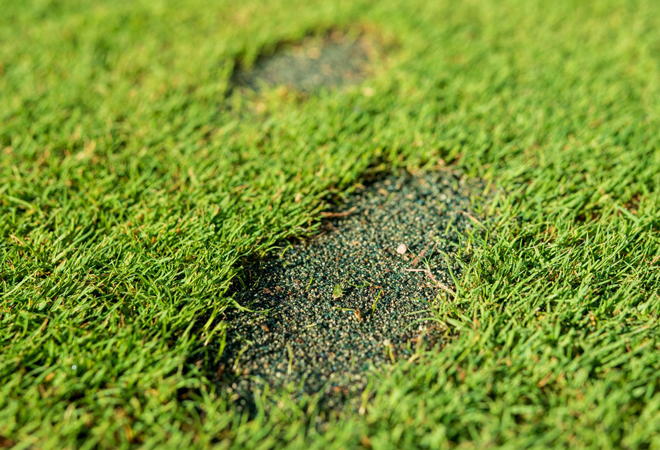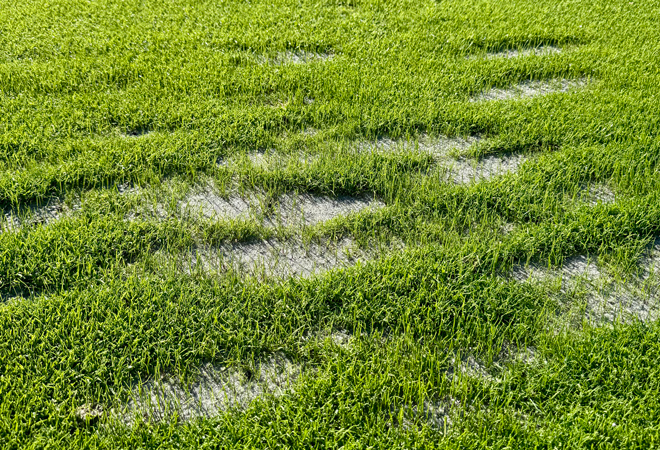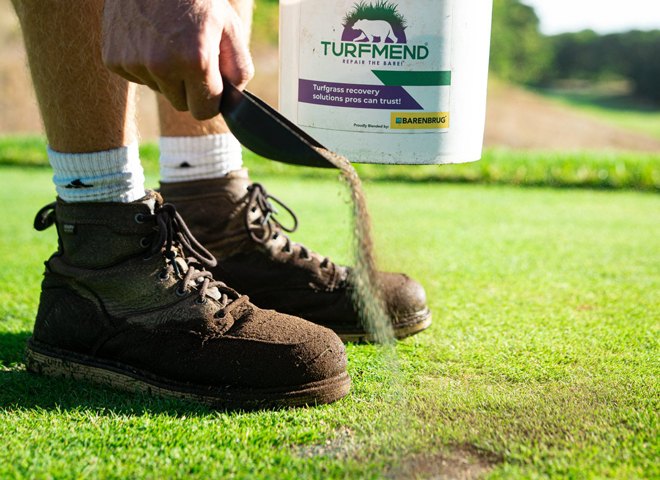Every divot tells a story — but on a well-maintained course, it shouldn’t leave a mark for long. A properly blended bentgrass divot mix helps turf recover faster, reduces weed invasion, and keeps playing surfaces smooth and uniform. Whether you’re repairing tees, fairways, or practice ranges, the right divot mix is an easy investment in playability and long-term turf health.
At Tee-2-Green, we know bentgrass better than anyone. Our varieties — like Pure Select®, Crystal BlueLinks®, PureFormance, and the Elite Bentgrass Blend — are trusted on top courses around the world for their color consistency, density, and recovery speed. Those same traits make them ideal for use in your divot mix.
Why a Bentgrass Divot Mix Matters
- Promotes quick seed-to-soil contact
- Holds enough moisture for germination
- Matches the surrounding bentgrass turf for seamless recovery
- Improves soil structure instead of layering foreign materials

Core Ingredients of a Bentgrass Divot Mix
The best blends balance seed, soil, and amendments for seedbed performance. A basic recipe includes:
- Sand – Provides drainage, keeps the mix free-flowing, and prevents compaction. Medium-coarse sand is preferred.
- Soil/Organic Material – A small percentage of native topsoil or peat moss helps retain moisture and nutrients without creating layering issues.
- Seed – Choose a high-quality Tee-2-Green creeping bentgrass seed, ideally the same variety or blend used on your greens, tees, or fairways.
- Optional Amendments – Small amounts of starter fertilizer (low N, higher P & K), biochar, or humic acid can give seedlings a stronger start.
Standard Divot Mix Recipe (Golf Course Ready)
- 70–80% sand
- 10–20% screened topsoil or peat moss
- 10–15% creeping bentgrass seed (mix lightly so it spreads evenly)
- Starter fertilizer (lightly dusted in, not over-applied)
Mix thoroughly until the seed is evenly distributed. Store in covered bins or buckets to prevent moisture from triggering germination before use.

Tips for Use
- Keep it fresh: Don’t batch too far in advance — bentgrass seed can germinate in storage if the mix gets damp.
- Fill divots properly: Overfill slightly, then level with your foot or club so the surface is flush.
- Water if possible: Moisture is critical for bentgrass germination. On greens or tees, light syringing helps divots establish.
- Adjust seasonally: In hot summers, mix in a small amount of compost for extra water retention. In fall, lean heavier on sand for drainage.
Prefer a Ready-to-Use Option?
Save time and reduce labor by purchasing a pre-mixed divot blend featuring Tee-2-Green Blue Tag Seed.
- Convenient and consistent
- Easy to store
- No mess or mixing required
- Ready when you are

For Distributors
Offering pre-mixed divot repair products with Tee-2-Green Blue Tag Seed helps your customers simplify their maintenance while achieving the best bentgrass recovery possible. Ask your Tee-2-Green representative for promotional materials or sample mix details to share with your customers.
Closing Thoughts
A well-prepared Tee-2-Green bentgrass divot mix keeps turf surfaces smooth, uniform, and healthy. Whether you blend your own or use a pre-mixed product, the right divot mix ensures faster recovery and consistent play quality — all built on the foundation of trusted Tee-2-Green genetics.
Want help choosing the right bentgrass for your divot mix? Contact your local Tee-2-Green distributor or visit https://www.tee-2-green.com/distributors to find the best option for your course.




